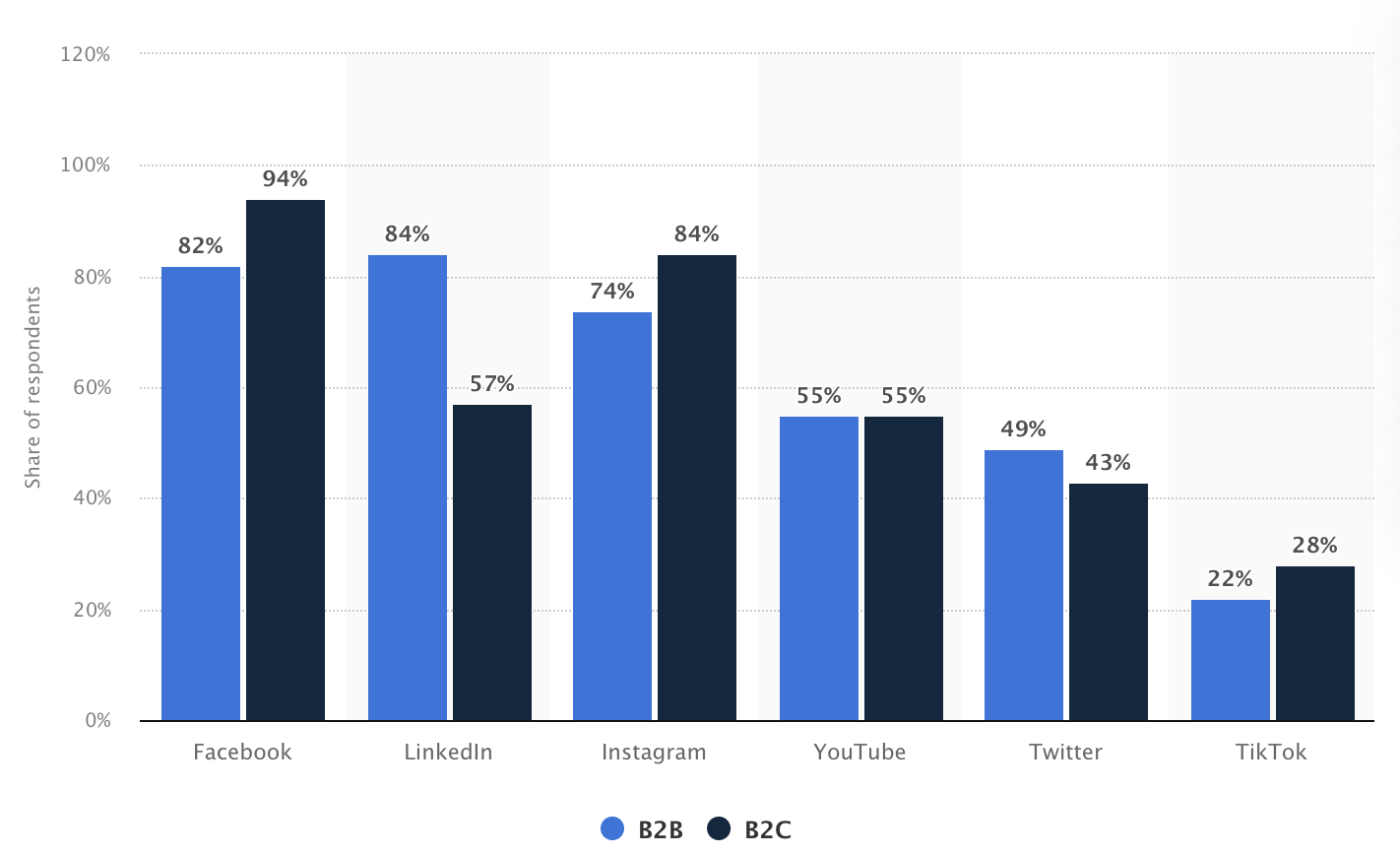B2B Social Media Marketing: 2025 Guide for Online Business
Summer Nguyen | 03-17-2025

According to Statista, 5.04 billion individuals engage in social media globally in 2025, with this figure projected to rise continually. With such a vast online audience and heightened connectivity, a robust social media strategy becomes imperative for any business.
While commonly associated with B2C enterprises, it’s equally vital for B2B brands to establish a noteworthy presence and generate compelling content to bolster visibility and drive sales. Crafting an effective social media strategy entails decisions on platform selection, content types, frequency of posts, and more.
This guide delves into the significance of social media marketing, practical implementation strategies, platform recommendations, and tips for crafting a successful B2B approach. Additionally, it offers further resources for in-depth exploration of key concepts.
B2B Solution Infosheet for Magento 2
An all-in-one solution to increase conversion rate and boost sales for B2B business

What is B2B social media marketing?

B2B social media marketing involves leveraging social platforms to promote products or services to business clients and potential prospects.
Unlike B2C (business-to-consumer) marketing, which targets individual consumers, B2B marketing necessitates a more strategic approach to engage with business owners and key decision-makers. Establishing and nurturing relationships with these stakeholders is crucial for securing significant purchase agreements.
While all social media channels can play a role in B2B marketing, the content and strategy employed will differ from those used in consumer-focused plans.
Why is B2B social media marketing important?
Social media provides a platform for brands to engage with both current and potential customers, fostering meaningful connections. While B2B marketing primarily targets businesses, social media emphasizes the importance of building human relationships, effectively achieved through various platforms. Key objectives achievable through social media include
-
Raise brand recognition
-
Generate and nurture leads
-
Enhance brand authenticity
-
Expand audience reach
-
Promote products and services
-
Facilitate direct customer communication
-
Fister community growth
-
Deliver creative and unique content
Beyond merely selling products or promoting brand identity, social media offers additional advantages. LinkedIn, for instance, serves as a valuable networking platform for professional connections and recruitment purposes, with 84% of B2B marketers leveraging it for such endeavors as of January 2022.

Moreover, Instagram boasts a staggering 70% of users looking to Instagram for their next purchase, while Facebook reaches more than 60% of the global social media population, making it a pivotal tool for B2B marketers to capitalize on.
Getting Started in B2B Social Media Marketing
To commence, you’ll require a B2B social media marketing strategy delineating how you’ll engage with business clients, bolster your online presence, and enhance your financial performance.
Let’s have a look at a systematic business-to-business social media marketing approach you can adopt to engage your audience and surpass competitors.
1. Establish Your Business Objectives
Begin by clarifying your business objectives before delving into social media marketing. Your strategy need not be intricate; it just necessitates clarity of purpose.
By outlining your objectives upfront, you ensure that every action taken on social media contributes directly to your desired outcomes. Thus, before formulating your social media strategy, ascertain where it aligns within the sales funnel. For many, this resides at the top, focusing on raising awareness. For others, it involves nurturing mid-funnel prospects through testimonials, case studies, and webinars.
Furthermore, cover essential aspects such as your target audience, chosen channels, content strategy, and tools necessary to streamline the process.
Related Post: Guide to Boost Sales with B2B Company Accounts Magento 2
2. Analyze Your Audience and Competitors
Recognize that competing B2B firms likely share overlapping social media audiences. Therefore, analyzing both your own audience and your competitors’ can yield valuable insights shaping your strategy.
Additionally, studying social channels with engaged audiences, even if unrelated to your direct competitors, can inform your approach.

Fortunately, several free and convenient methods exist for conducting social media competitor analysis. Begin by observing and following your competitors’ social media accounts, paying attention to their posts and audience engagement.
For deeper insights, leverage platform-specific reports provided by your social media business pages, such as Facebook Insights, offering demographics, interests, and engagement metrics. If ready for more advanced analysis, numerous resources are available to further understand your target audience.
3. Develop Original, Authentic Content in Your Brand’s Voice
After clearly defining your goals, understanding your audience, and analyzing competitors, focus on crafting compelling content. The content shared on social media represents your brand’s voice, enabling you to convey your story and establish meaningful connections with your audience. Capturing and retaining audience attention hinges on content quality and presentation.
Here are some recommended strategies for creating content:
Come up with your message
Begin by clarifying the core messages that reflect your brand’s vision. Emphasize clearly articulating what your brand represents, laying the foundation for deeper, more meaningful engagement with your audience.
Repurpose your content
To optimize your impact and expand your reach, consider adapting existing content to suit various social media channels. For example, transform a blog post from your company blog into an infographic highlighting key points, ideal for swift distribution across different platforms.
Alternatively, condense a YouTube video from your channel into a Twitter thread or LinkedIn carousel.
Diversify content formats
In the realm of social media marketing, the focus has evolved from merely accumulating followers to prioritizing interaction. To sustain audience interest, diversify your content formats. A blend of sales-oriented posts, educational content, inspirational material, and informative updates will keep your audience engaged and well-informed.
Some effective content types include:
-
User-generated content (UGC)
-
Live streams and Q&As
-
Long and short-form videos
-
AI-generated content
-
Testimonials
-
Case studies
-
Blogs and infographics
-
Polls and quizzes
Integrate video content

Videos are effective tools in social media marketing, offering a dynamic means to engage your audience.
However, different types of video content, such as explainer videos, product demonstrations, behind-the-scenes glimpses, and customer testimonials, each offer a distinct experience.
Traditionally, video production has been a time-intensive process. This is where utilizing video-making tools becomes advantageous.
Additional tools worth exploring to create your own images and videos for social media include: Canva: Canva is a versatile tool for designing social media graphics, presentations, and invitations, boasting a user-friendly interface that facilitates the creation of professional-looking content quickly and efficiently.
Loom: Loom enables effortless recording and sharing of video messages, readily distributable across social platforms, fostering engaging content that resonates with social media audiences.
Giphy: Giphy offers the option to create personalized GIFs or choose from a selection of pre-made animated GIFs, adding an entertaining element to social media posts.
4. Engage in Social Conversations
If it hasn’t become clear already, active engagement lies at the heart of social media marketing. It entails more than simply sharing content; it involves actively participating in discussions that resonate with your audience.
Here are several effective methods for creating and interacting on social platforms:
Develop interactive content
Instead of solely broadcasting to your audience, actively listen to them. Encourage interaction by posing questions. Utilize formats such as live streams, polls, and surveys to invite your audience to express their opinions, transforming your page into a platform for two-way communication.
Manage groups and forums
Engaging in online groups can bolster your social media presence by nurturing communities. Sharing expertise, providing solutions, and participating in discussions are effective strategies for establishing authority and trust within your industry.
Respond to social media posts
Arguably the most crucial tip, engaging with posts demonstrates to your audience that you value their opinions and are dedicated to fostering meaningful conversations. Timely and thoughtful responses have the potential to convert casual followers into staunch supporters of your brand.
5. Work with B2B Influencers
According to Semrush’s 2025 Social Trends Report, leveraging influencers is poised to become a pivotal trend. This shift is attributed to audiences placing slightly higher trust in influencers compared to direct brand influence, as they don’t anticipate a direct sales pitch.

Consequently, the emphasis has transitioned from relying solely on an influencer’s follower count to establishing enduring partnerships with personalities who authentically resonate with your business’s values and can genuinely articulate its narrative.
By identifying suitable influencers and collaboratively crafting tailored content for each influencer’s audience, you can delineate your business’s distinct value proposition and personalize the promotional process.
Best Social media platforms for B2B marketing
Instagram presents opportunities for B2Bs to enhance brand visibility, generate leads, and drive sales. To leverage Instagram for B2B marketing, businesses must first establish an Instagram account. Once the profile is set up, posting photos and videos becomes essential. Content can include product showcases, team highlights, office insights, and customer stories, along with quotes and industry-related infographics.
Consistent posting and strategic use of relevant hashtags are crucial. Leveraging the hashtag search bar aids in finding pertinent industry hashtags, while the geotag feature allows businesses to tag their content with their location.
To utilize Instagram effectively for B2B marketing, businesses need to create a dedicated business account, optimize the profile with pertinent information, and commence regular posting of engaging photos and videos.
While all social channels play a role in B2B marketing, certain platforms excel in engaging B2B audiences more effectively.
LinkedIn stands out as one of the foremost platforms among B2B audiences. It offers businesses the opportunity to connect with other businesses, interact with potential clientele, and, if utilized strategically, establish themselves as industry thought leaders. Leveraging a range of tools and features like LinkedIn Newsletters, B2B brands can enhance brand visibility, cultivate an actively engaged audience, and generate new leads.
Read more: LinkedIn for B2B marketing
Another prominent B2B social media platform is Twitter, serving as a gateway for brands to foster personal connections with industry experts, influencers, and like-minded individuals. Executive leaders can harness social listening to grasp their audience’s sentiments and capitalize on Twitter’s immediacy to identify trends, initiate direct interactions with followers, and drive engagement.
Unlike other platforms, Twitter provides brands with a distinct opportunity to demonstrate vulnerability, amplify diverse voices, and forge a loyal community of meaningful connections. It empowers companies to adopt an authentic customer-centric B2B social strategy.
Best practices for B2B social media engagement
Humanize Your Communication
Remember, you’re not just addressing businesses; you’re engaging with the individuals behind those brands. 64% of executives prefer a conversational tone over a formal one. Recognize that your audience includes not only CEOs and purchasing officers but also up-and-coming professionals who will shape future purchasing decisions. Incorporating employee stories and achievements into your content humanizes your brand and enhances recruiting efforts.
Provide Value
Deliver content and resources that make your audience’s professional lives easier or more enjoyable. Offer how-to guides, industry news, trends, tips, and strategies. Emphasize thought leadership, as 61% of decision-makers believe it effectively demonstrates the value of products/services. When promoting your products, focus on real business benefits, such as increasing profit margins, retaining customers during downturns, and outperforming competitors.
Use Humor
Utilize humor tailored to your audience to foster engagement and build long-term relationships. While B2B content is often perceived as serious, incorporating appropriate humor can enhance content appeal. Find the right tone that resonates with your audience, whether it’s an industry-specific joke or a clever pun that highlights product benefits. Show your audience that you understand social media as a platform for entertaining and engaging content.
Respond Promptly
Responding to direct messages (DMs) and comments promptly is crucial for nurturing leads and maintaining engagement. Every interaction represents an opportunity to deepen connections with your audience. Utilize tools like Hootsuite’s consolidated social media inbox to efficiently manage and respond to messages across multiple platforms, ensuring no inquiries or comments are overlooked.
B2B Social Media Marketing Examples
Hootsuite

Hootsuite exemplifies effective B2B social media marketing by prioritizing content that blends entertainment with education. Their strategy involves leveraging a diverse range of platforms to disseminate their content, thereby maximizing their audience reach and engagement.
Dell

Dell is renowned for its proactive approach to reaching its audience through innovative means. Leveraging social media effectively, Dell has achieved notable success in sharing relevant content tailored to its audience’s interests. Additionally, Dell utilizes social media platforms to offer valuable insights aimed at empowering its followers to enhance their brands.
IBM

IBM stands out as a company committed to continuous innovation, extending this ethos to their B2B social media marketing endeavors. Through a strategic approach, IBM utilizes a diverse array of platforms to disseminate relevant content tailored to their audience’s needs. Their B2B social media strategy focuses on delivering valuable content aimed at assisting followers in enhancing their businesses.
Conclusion
B2B social media has become a permanent fixture in the marketing landscape. It stands out as one of the most efficient and impactful avenues for B2B companies to establish their brand and engage with their target audience.
Gone are the days when buyers solely relied on visiting websites to make purchasing decisions. Instead, the emphasis is now on cultivating enduring relationships with business owners and decision-makers.
By positioning your brand as an industry expert and consistently providing valuable insights, you can foster trust and loyalty among your audience, paving the way for long-term partnerships and success.

Discover Magento 2 B2B today and bring your wholesale business to the next level
Check it out!





